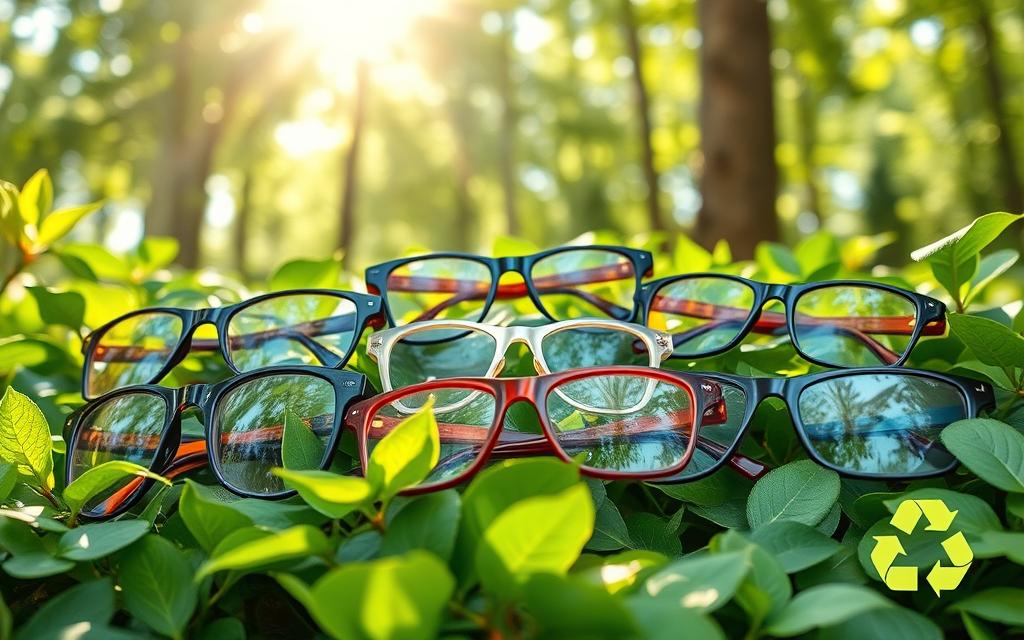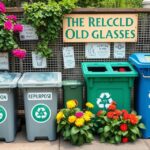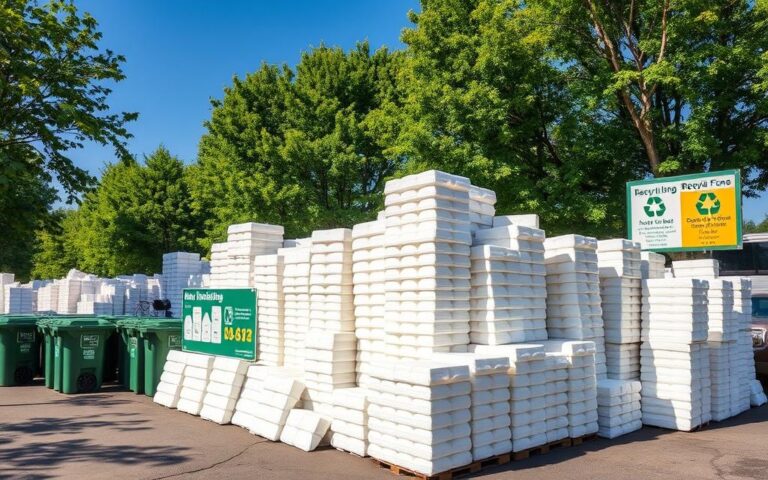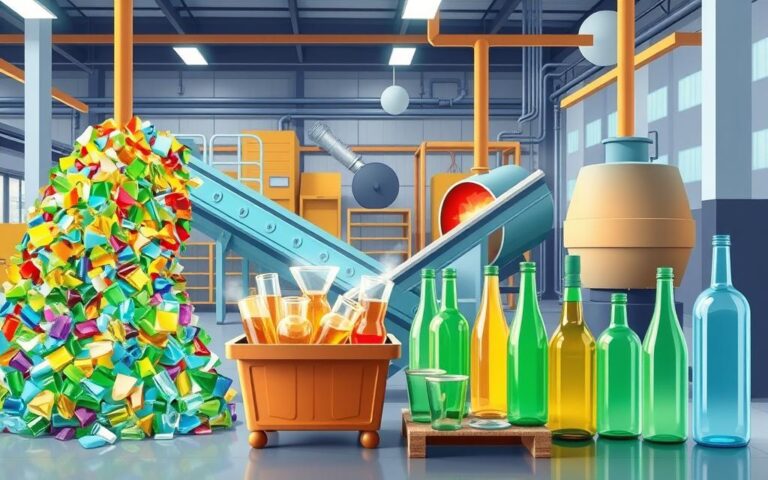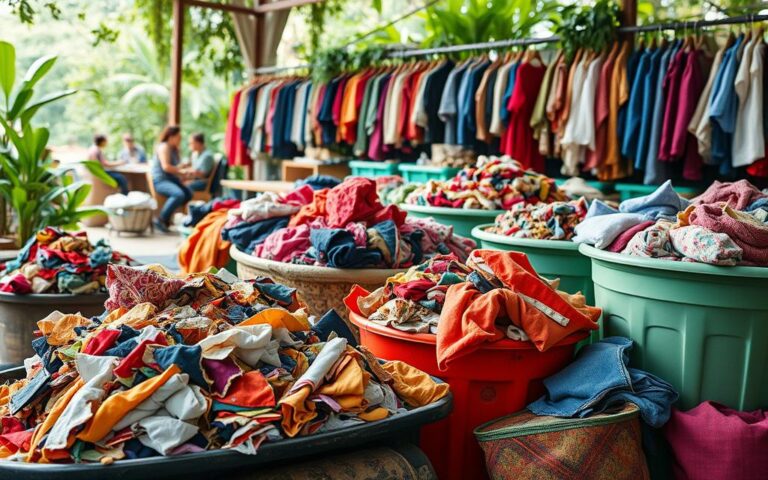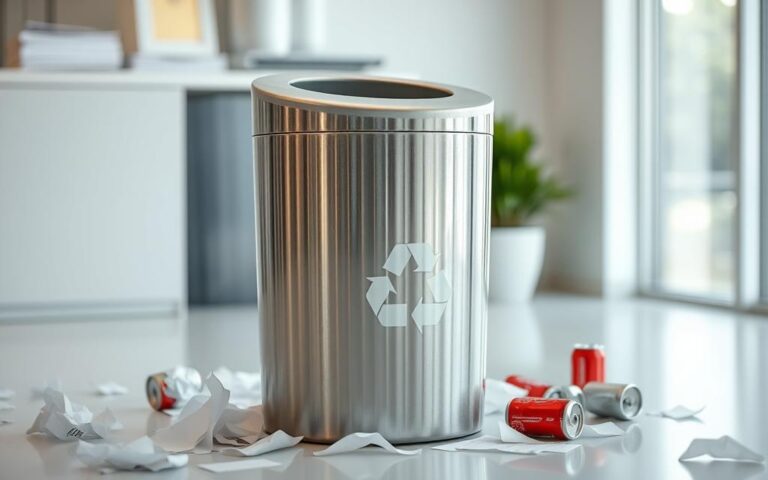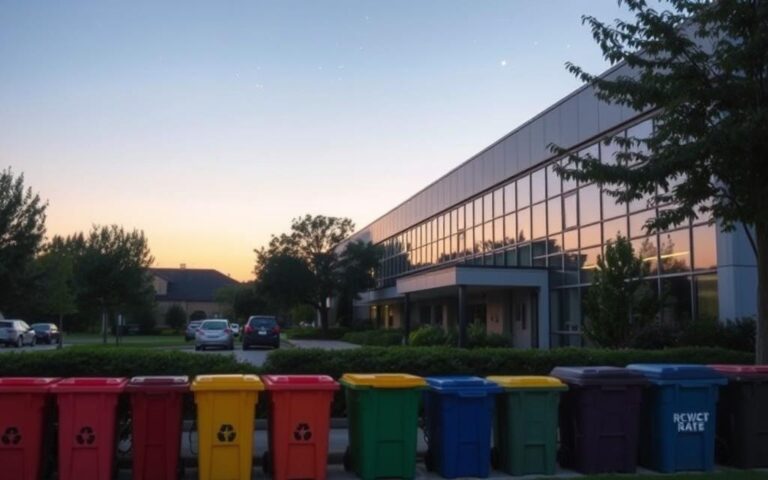Can You Recycle Eyeglasses? Best Ways to Dispose Responsibly
Over 166.5 million Americans rely on eyeglasses, and 223.5 million wear sunglasses regularly. This brings up a big question: can we recycle eyeglasses? With 393 million pairs thrown away every year, finding responsible ways to dispose of them is crucial. It’s important to understand the environmental impact of discarded glasses.
When we talk about recycling eyeglasses, we need to consider the role of plastic. Our choices can help reduce plastic waste. Programs like “Recycle for Sight” by Lions Clubs International show how we can help others while caring for the planet. Since 2001, groups like Close the Loop have pushed for recycling. By choosing responsible disposal, we can make a positive impact.
Understanding the Environmental Impact of Eyeglasses
The making and throwing away of eyeglasses harm the environment, mostly because they use a lot of plastics. These traditional eyeglasses don’t break down, adding to plastic waste and pollution. The frames and lenses are mostly plastic, adding to the problem and hurting our ecosystems.
The Role of Plastic in Eyewear Manufacturing
Making eyewear uses a lot of energy, from mining to manufacturing, which leads to more energy use and waste. Every pair of eyeglasses has many parts, all increasing the environmental burden. But, using materials like bio-based plastics and recycled items are better choices. Companies like SIRIS that use natural things such as walnut or recycled vinyl show a move to greener options.
Consequences of Improper Disposal
Throwing away eyeglasses the wrong way is bad for the planet. They often end up in places like landfills, leading to tiny plastics in our soil and water. This is harmful to sea life and our ecosystems. We can help by reusing frames or using recycling schemes. Experts say that behaving responsibly with waste helps keep materials in use, helping the environment.
To learn more about the environmental impact of glasses and how to throw them away the right way, look into various methods and projects. It’s about making good choices for our world.
Can You Recycle Eyeglasses?
Recycling eyeglasses helps reduce waste in landfills and saves resources. It’s important to know what eyewear materials are used. Glasses are made from plastic, metal, and sometimes glass. Different parts of glasses can be recycled at different rates, affecting the recycling process.
What Materials Are Used in Eyeglasses?
Common eyewear materials include:
- Plastic: Often used for frames and lenses, making them lightweight and cost-effective.
- Metal: Typically applied in frames, providing durability and a contemporary aesthetic.
- Glass: Occasionally used in high-end or prescription lenses due to its optical clarity.
Plastic and metal in glasses can be recycled, but it depends on the recycling centre. Some parts, like certain lenses and coatings, might not be recyclable everywhere.
The Recycling Process Explained
Here’s how the recycling process for eyeglasses works:
- Collection: Eyeglasses are collected through donation bins and recycling centres.
- Sorting: Glasses are sorted by material and condition.
- Processing: The frames are recycled by material type, separating plastic and metal.
- Re-manufacturing: Recycled materials are used to make new products, cutting down on the need for more resources.
Always check local recycling rules, as not every place takes all glasses parts. Knowing what can be recycled is key. Raising awareness can make recycling glasses a normal part of our lives, helping the environment.
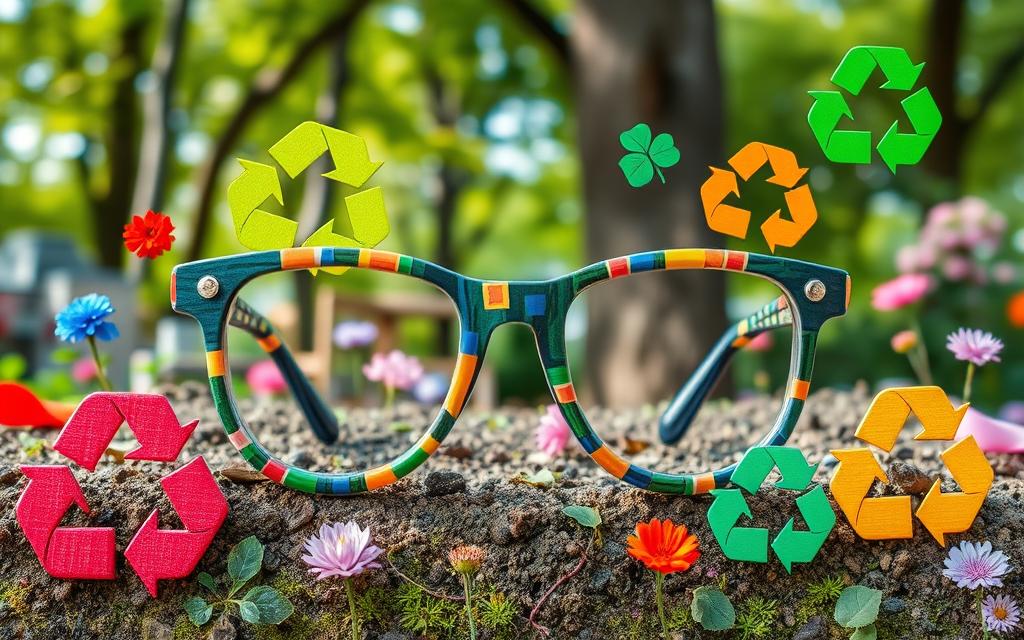
| Material | Recyclability | Common Usage |
|---|---|---|
| Plastic | Varies by type; many are recyclable | Frames and lenses |
| Metal | Generally recyclable | Frames |
| Glass | Recyclable but often not accepted | High-end lenses |
Best Practices for Donating Old Eyeglasses
Donating your old eyeglasses is a great way to help people who have vision problems. Over a billion individuals around the world can’t get good eye care. Your glasses could really make a difference. There are many groups that collect and give away glasses to those who need them. They make sure your donations get to the right people.
Organisations That Accept Eyeglasses
Many trustworthy groups take eyeglasses donations. They work to make eye care easier to get. Some well-known ones are:
- Lions Clubs International has been leading eyeglass donations for over a century. You can find their donation boxes in places like Walmart and Sam’s Club.
- New Eyes started in 1932 and helps by giving used eyewear to poor communities.
- OneSight has helped nine million people in 46 countries by providing glasses through clinics.
- VSP Global’s Eyes of Hope gives free eye care and glasses to over two million people globally.
- ReSpectacle is a charity that matches donated glasses with communities that need them, improving access to vision care.
How to Properly Prepare Your Eyeglasses for Donation
Before you donate, make sure your glasses are ready and in good shape. Follow these steps:
- Start by cleaning the eyeglasses well to get rid of dirt.
- Check if there’s any damage like broken frames or scratches.
- Make sure there are no personal items on the glasses.
- Look for a local place to donate, like Lions Clubs or certain stores.
- Think about keeping a record for possible tax deductions.
Donating glasses is a beautiful way to prevent waste and help others. It aids people who can’t afford eye care. So, you become part of a worldwide move to boost lives through improved sight.
Responsible Disposal of Eye Care Products
It’s vital to dispose of eye care products properly to lessen environmental impact. Many people don’t know which items can be recycled or thrown away safely. Knowing how to dispose of different eye care items is key to protecting our planet.
Understanding Which Products Can Be Recycled
Though often overlooked, some eye care products can be recycled. For example, you can recycle contact lens packaging. But, you should not recycle the lenses themselves. Research shows that 1 in 5 people flush their contact lenses, leading to microplastic pollution. This pollution harms marine life. So, it’s important to throw away contact lenses in the bin to avoid these issues.
Avoiding Flushing Contact Lenses
The disposal of contact lenses affects more than just personal choice. Microplastics from lenses can endanger ecosystems during water treatment. We can help by disposing of eye care products in an eco-friendly way. CooperVision is working towards net plastic neutrality. They collaborate with Plastic Bank. This helps create recycling programs in areas that need them most. Doing this helps the environment and supports sustainable practices by groups focused on ethical recycling.
Buying Environmentally Friendly Eyewear
The demand for eco-friendly eyewear shows a big change in consumer attitudes towards sustainability. Eyewear sales might hit US$206.1 billion by 2032. Brands are now making eco-friendly glasses. They focus on style and reducing harm to the planet. They use green materials to help the environment.
Frames Made from Recycled Materials
Brands are now using recycled materials to make eyeglasses. In the eyewear industry, up to 75% of acetate could be wasted. So, companies are looking for better options. They use old wood and mix recycled plastics with natural fibres like hemp. This cuts down carbon output and offers cool frames. Buying these frames helps firms that give back to eco causes like tree planting.
Choosing Sustainable Contact Lenses
Opting for eco-friendly contact lenses aids our planet too. CooperVision works to lower its eco impact with eco-conscious lenses. Customers can find brands that care about making less pollution. Choosing eco lenses helps your sight and the planet. For info on recycling glasses, see this link.
How to Find Local Recycling Options
Looking for the right places to donate eyeglasses and understand local recycling can really help your area and the planet. Organisations like Lions Clubs play a big part in recycling, offering you a chance to donate used eyeglasses. It’s important to know your community’s waste policies to make sure your recycling efforts fit with local guidelines.
Finding Lions Clubs for Eyeglass Donations
Lions Clubs have a wide network focused on supporting people who need eye care. They run many recycling centres where your old eyeglasses are welcome. Their “Lions Recycle for Sight” program collects glasses to give to those in need. To find a club nearby, check their official website or get in touch with a local chapter.
Checking Local Waste Management Policies
To dispose of eyeglasses correctly, see what your local waste policies suggest. Many places have rules on recycling that help manage unwanted items properly. By looking at your local government’s website, you can find special programs and places for eyeglass recycling. This helps you throw away less and recycle more.
Conclusion
Learning how to recycle glasses is key to lessening the harm thrown away glasses cause our planet. Modern plastic glasses can sometimes be recycled in some places. But, the materials in glass lenses usually can’t be recycled in city systems. This means we need to throw them away carefully.
By giving your old glasses to groups like Lions Clubs International and OneSight, you can help people who need them. Yet, it’s vital to think about if they fit well and are clean for the next person. By donating, reusing in new ways, or buying green products, we all can help reduce waste and support good causes.
In the end, recycling glasses helps us lessen our mark on the earth and helps important projects. Making smart choices when getting rid of glasses allows us to help make a better future.
FAQ
Can I recycle my old eyeglasses?
Yes, you can recycle many old glasses. Yet, how you do it depends on what they’re made of and your area’s rules. Always check local recycling guidelines first.
What materials are typically used in the production of eyeglasses?
Glasses are mainly made of plastic and metal. The cases and cleaning bottles also use plastic. This increases their environmental impact.
Why is it important to dispose of eyecare products properly?
If eyecare products like contact lenses are thrown away wrongly, they can pollute rivers and oceans with tiny plastics. This harms sea life and the environment.
What should I do with old eyeglasses that I no longer need?
Think about giving them to charities like Lions Clubs International or ReSpectacle. They give them to people who need them.
Can I recycle contact lenses?
Sadly, you can’t usually recycle contact lenses with regular recycling. It’s safer for the environment to put them in normal rubbish.
How can I find local recycling options for eyeglasses?
To find recycling spots, try charities like Lions Clubs. Or check with local recycling centres and waste rules.
Are there brands that focus on sustainable eyewear?
Indeed, some brands use recycled materials, like old fishing nets, focusing on eco-friendly glasses. Companies like CooperVision are a good starting point.
What steps can I take to prepare my eyeglasses for donation?
Clean your glasses well and make sure they’re in good shape to donate. Reach out to local groups for any more advice on donating.

